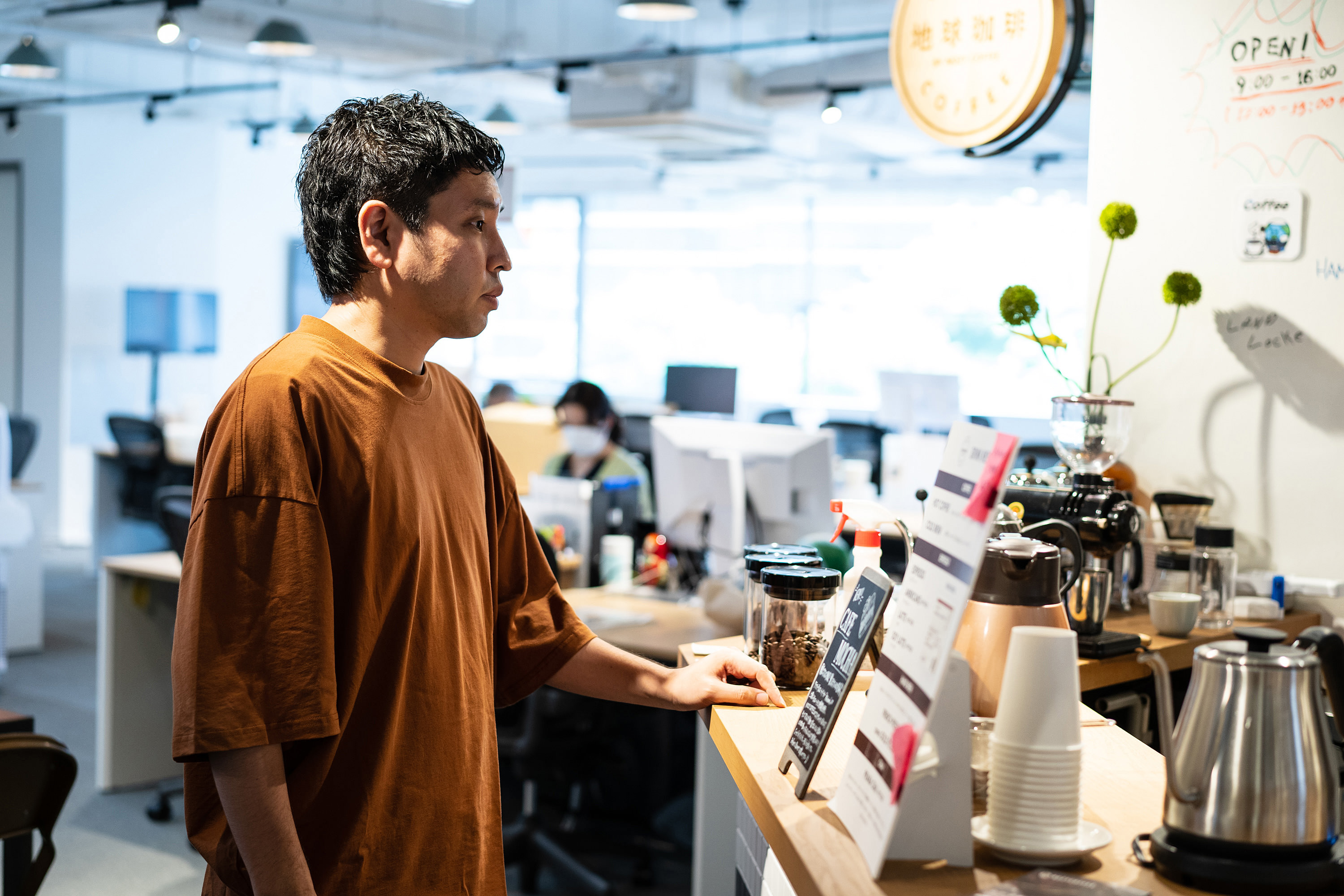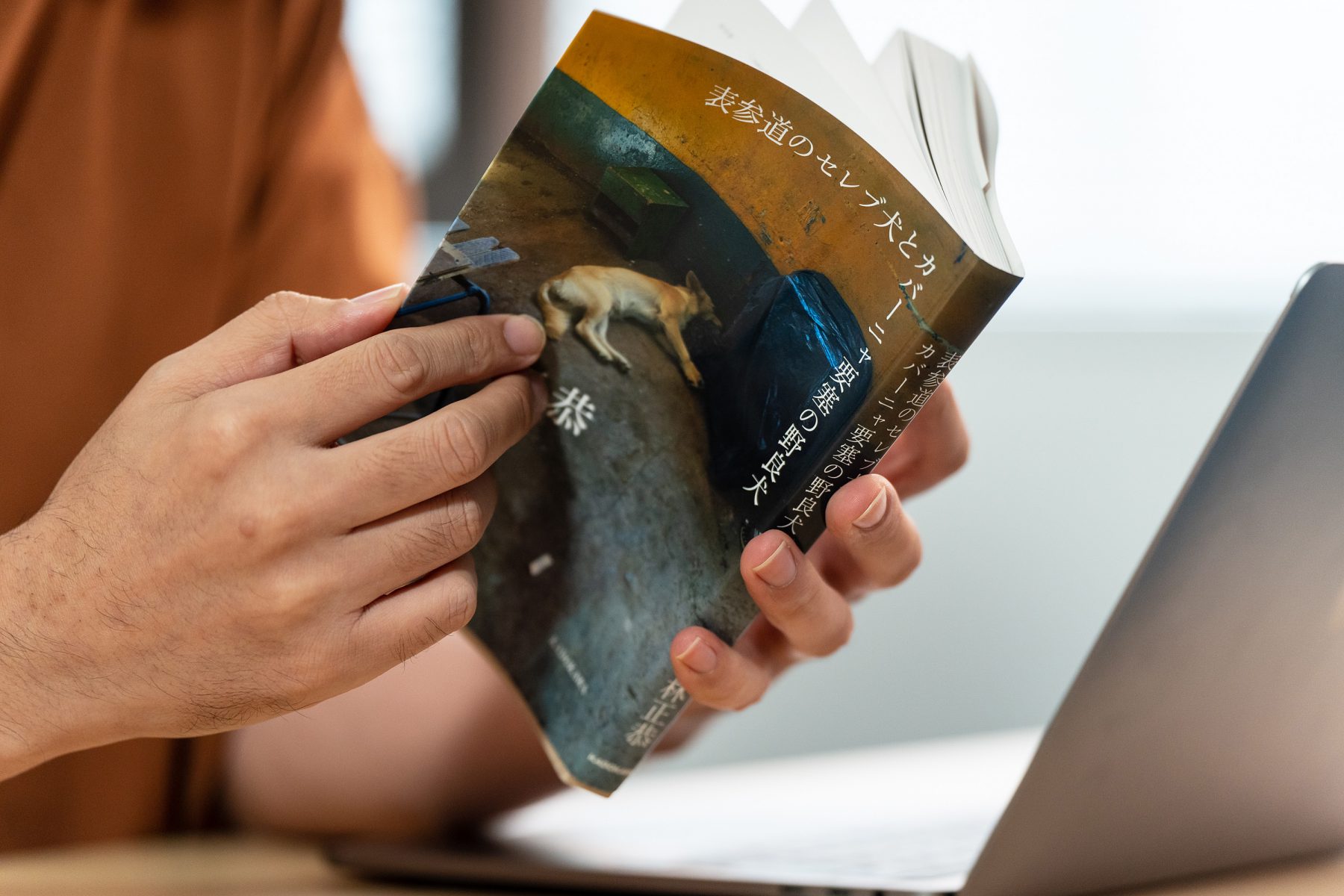
Bringing even more information to each and every user
What was it that initially got you interested in work related to the Internet?
Looking back, I was the kind of student who only played baseball until the summer of my senior year of high school. And I chose my college department, Commerce, based on what was included on the entrance exam; the more the test included subjects that I was good at, the less I would have to study. (laughs) However, majoring in business administration made me realize that there are interesting parts to business, such as running a business, and I think that was very significant in the end.
Even with the limited knowledge of a student, when you’re learning about the histories of businesses like Sony or Toyota as part of your business administration research, you will be able to recognize periods that must have been the most interesting for the company. While learning about what companies were doing at different stages in their development, I realized that I was especially interested in the early stages of companies with great potential. My thoughts about what I wanted to do next were influenced by the question, “which Japanese company was the next high potential player?”
At the time, the next high potential industry was IT and Rakuten was a high potential company. I considered smaller ventures, but I didn’t have work experience at the time. Not only was Rakuten growing at an incredible speed, but it could also provide me with an environment where I could acquire basic skills. That was a big part in my decision to join.
You had been working in Singapore right up until you joined SmartNews, right?
That’s right. The new business I was in charge of launching at Rakuten was doing relatively well in Japan. The decision was made to expand overseas, so I brought the entire business to Singapore. I was there for just about four years. At my previous job, I had the chance to challenge various positions such as launching new businesses. But I wanted to be more involved in the growth and strategy of a whole company at the early stage of its development, so I decided to look for a new opportunity. From there, I was introduced to a number of so-called start-up companies and had many conversations with them. One of those companies was SmartNews.
To be honest, I thought that SmartNews had already grown too big to match the profile of the kind of company I was interested in. But during the interview process, I thought about the company’s mission statement: delivering quality information from around the world to those who need it. I realized that there isn’t a person in this world who would be someone who didn’t need information. If that’s the case, then it means that the ultimate goal of SmartNews is to be used by everyone in the world. This made me think that there was still room for me to make an impact at the company.
Up until that point, I had a limited understanding of news apps, thinking of them as simply distributing content created by publishers. It was the mission of SmartNews that helped me to completely change my perspective. But more than anything, it was talking with Ken Suzuki, the CEO of SmartNews, that made me interested in this company.
Can you tell us more about the details of your conversation with Ken-san?
During the interview, I asked him what the goals for SmartNews were. I totally thought he was going to start talking about something like how they planned to grow the business, but instead he said, “we want to contribute to a just democracy.” That answer showed that the company’s plans were on a much larger scale than I had imagined, and it left a deep impression on me. It was supposed to be an interview, but I spent about 45 of the 60 minutes I had with him listening to Ken-san’s passionate speech about the transition of democracy and the filter bubble. (laughs) I decided to join the company because of the passion I felt from Ken, the co-founder, the environment where I felt I could still make an impact in the company, and the grandeur of the mission.
After joining the company, were you assigned to the product division?
When I first joined the company, I was in the product division, but my role was more like business planning by myself. Then I started to focus on marketing, and then I started to do half marketing and half product, and now I’m back in the product division. To be honest, the content of what I do hasn’t really changed.
I was basically told that I could do whatever I wanted as long as it was contributing to the growth of SmartNews. Given the company’s business model, contributing to the growth of SmartNews can be broadly broken down into two activities: increasing the number of users and increasing the profitability per user.
Although I was involved with projects focusing on the latter for a while, I am still basically in charge of the former, focusing on the goal of maximizing the number of SmartNews users in Japan. That’s why I don’t just launch a product and be done with it. For example, when I was the product manager for our coupon channel, I was not only involved from the concept to release, I also went out to gather coupons we would use in the channel.
A product manager will go to those lengths, right? (laughs)
Sometimes I wonder. (laughs). There are so many different definitions of what a product manager is, and there are also many different ways to create a product. In the case of SmartNews, it may be particularly unique. The team that makes a product is called a squad at SmartNews. A common setup for product development is the combination of the product manager and the engineer or engineers. However, in our case, we include marketing members and content acquisition members in the project, so that we can plan a total project that includes getting the users to know and use the product properly.

There are nearly unlimited ways of achieving your goal of maximizing the number of users. How do you choose the best strategy from among the options available?
In the end, there is only one point we use to choose our course of action. That is, how much impact will this make? In the case of my field, the level of impact is equal to how many more users we acquire, so it’s all about creating features that users need, when they need them.
Of course, we take surveys, ask researchers, and conduct interviews with users to find out what services are popular now and how we can translate them into our products, but it’s conversations with friends and family that often give us hints. I try to consciously listen to the people around me about the things they are struggling with.
From the perspective of a product director, how do you want to develop the SmartNews product in the future?
The mission of Smart News is to “deliver quality information from around the world to those who need it.” I believe that the information we currently handle is only a fraction of what is available. The Coupon Channel, which I was involved in three years ago, was released based on a sense of such issues, and although it was a slightly different type of information than what SmartNews was dealing with at the time, we released it because we thought it was necessary for users. I would like to continue to expand the scope of the product in this way and create a product that can provide more necessary information for each user.
Do you have conversations like this with the squad in charge of products in the US?
Yes. We share information very closely with the U.S. growth squad in particular. While the U.S. and Japan markets have very different characteristics and the priority regarding topics to be addressed is also different, we are still able to benefit from using each other as a point of reference. For example, we can look at an example of our success in the U.S. market and use that as a foundation for a discussion like, “if we were to develop this in Japan, it would be better if we customized this part,” or, “let’s do the exact opposite of what they did in the U.S.” We may expand to other countries in the future, so the sense that we’re competing on the world stage as a single application is really fun.
What kind of people are you looking for to join your squad in the future?
Since the person will be managing a cross-functional squad, it’s a given that they have communication skills that can build consensus. Additionally, it’s not only enough to focus on creating a good product; the person should also be focused on creating a product that can produce an impact. I think that people who have knowledge not only in the product development area but also in the business area are best suited for this job.
Books
Book Recommendation

Contemplating the meaning of diverse values in a travelogue about Cuba
This is a book written by the comedian Masayasu Wakabayashi from the comedy duo Audrey. The reason I was first interested in this book is because I love Audrey. The book is a non-fiction travelogue, and it describes how Mr. Wakabayashi felt uncomfortable in Japan, where “success and making money is the right thing to do,” and how he thought the source of this uncomfortable feeling might be due to the structure of Japanese society. As a result, he decided to go to a country with a completely different culture, and the book tells the story of his experiences in Cuba. I enjoy traveling as well, and this book inspired me to visit Cuba, myself. I am not as troubled or introspective as Mr. Wakabayashi, but I still wondered, “what kinds of things would I be thinking if I was born in Cuba instead of Japan? What kind of things would I need?” Thanks to this book, I was reminded that everyone thinks differently and that I should always be questioning what I think of as “normal.”
A Celebrity Dog in Omotesando and a Stray Dog in Fort Caberna
Author: Masayasu Wakabayashi
Publisher: Kadokawa
Date published: July 2017


